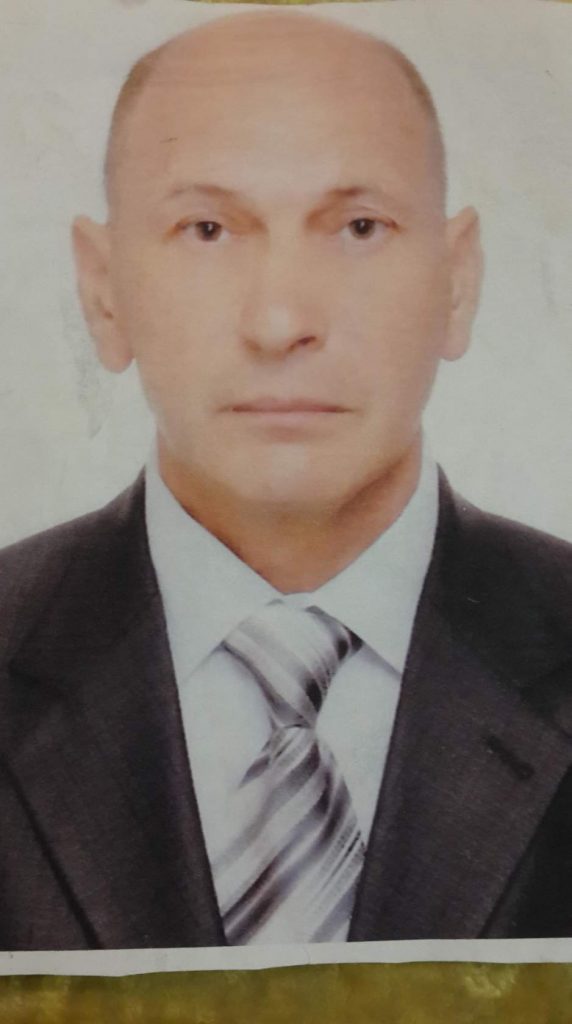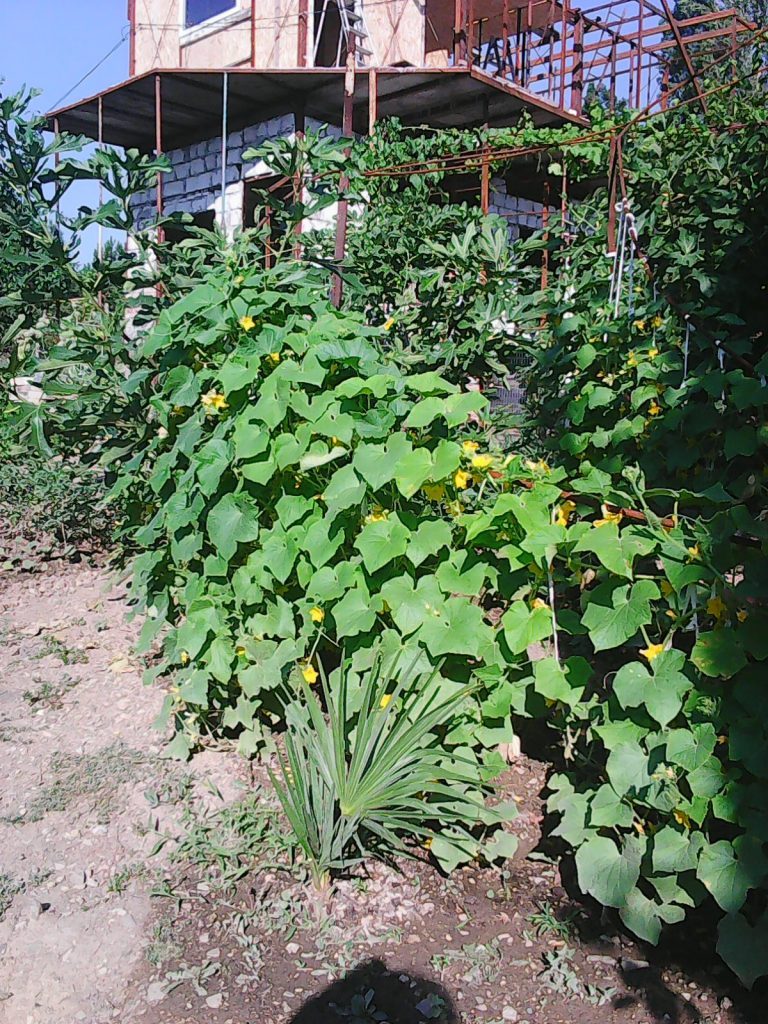Enver Khalilov in school years
Crimean Tatar is not a nationality
It is but a profession …
Many obstacles stood in the way of our return to the Crimea, but we returned and settled on our native land. This testifies to the healthy roots of the working people, the builder, the creator! I would like to tell me about one such worker, a jack of all trades, in my essay.
Refat Abdureshit oglu Khalitov was born in 1921 in the village of Beshui, Bakhchisaray district. Aside Refat, there were four other children in the family of Abdureshit and his wife Zadae: Zuleikha (born 1913), Shevket (born 1916), Quddus (born 1925), Shefika (born 1927). The family lived in Beshui until 1932 and was considered prosperous. And they were prosperous thanks to their hard work and ingenuity. As members of the family recalled, their great-grandfather had an outstanding personality. He studied gardening, and even his life paths intersected with the famous breeder Lev Simerenko.
Having received a good education, his great-grandfather returned to Beshui. The family took up gardening. 6 hectares of land was freed from forest plantations, and a garden was planted with high-quality fruit trees, mainly apple trees. Proper care of the trees in a few years allowed us to get high yields of fruit. But the ill-fated time of expropriation came, when the state began to struggle with the best literate representatives of the people in rural areas. The family in 1932 had left without land and was forced to move to Aqmescit, where they lived until the deportation.
Before deportation Refat Khalitov got into the labour army in Tajikistan. Worked in uranium mines. There he met his future wife Halise Ablaeva, whose family as part of our compatriots was sent to Tajikistan. Two children were born in the family after the marriage, Lilya in 1954 and Osman were born in 1956. Shortly before the decree on permission to reunite with their relatives, the family moved to the city of Guryev in Kazakhstan, where other family members were deported.
For this reason, Refat was forced to change one letter in the family name so that the authorities would not persecute for the move and become Khalilov instead of Khalitov. In Guryev, he worked as a glazier, and his spouse as a controller at DSU-29. In 1959 their son Enver was born, and daughter Elmira in 1964.
In 1967 a decree was issued allowing the Crimean Tatars to live in any part of the USSR.
Alas, this was far from the case, which caused many families to suffer, who believed the decree and started returning home. In 1968, the Khalilovfamily sold the house and flew to Simferopol. Here, near the railway station, the parents checked the documents. Upon learning that they were Crimean Tatars, the police gave the order that the family leave Crimea within 24 hours. When the parents referred to the new decree, the police, roughly cutting them off, demanded to leave Crimea. The family went to Dzhankoy in the hope of settling in the steppe part of the Crimea. Upon arrival, the family immediately met a police squad and, after checking the documents, repeatedly demanded to leave Crimea. Mother entered a heated argument with the police. She told them that they had come home, that the family had sold the house in Guryev, that they had four children and there was no going back! To this, the police responded rudely, threatening to put the parents in jail and to hand over the children to an orphanage. Next, they tied hands and feet of parents and threw them with the children in the back of a truck and took them outside the Crimea to Novoalekseevka. With these words, the hero of my essay, Enver Khalilov, a 58-year-old man, had tears running down his cheeks — so much so that this tragedy left a deep mark on the soul of a baby! The family was sheltered by several compatriots, who after the ordeal also settled in Novoalekseevka.
The father and mother began to work on the cooperative farm. Enver went to 3rd grade. It was 1968. Since childhood, Enver had an interest in radio engineering and technology. Also, he began to attend the classes of radio amateurs, karting and modelling. He was fond of football. In 4-5 forms, he was already able to easily “read” radio amateur circuits and began to design radio equipment, receivers, amplifiers, electric guitars, radio transmitters. Together with his fellow enthusiasts, they began to communicate with radio amateurs from Kazakhstan, Belarus, and Krasnodar Territory. Swallowed by success, children did not even know that communication on radio frequencies is strictly prohibited. In 8th grade, Enver himself assembled a TV, since such a purchase was beyond the means of a family. During one session, a military vehicle with a direction finder arrived in the yard, and all the equipment of the young radio amateur was seized. He was put on the list of radio hooligans.
However, every cloud has a silver lining! It seems that a military squad at the same time took note of an inventive young man. And when the time did come to serve in the army, he was sent to the naval radio engineering forces. He served in Severomorsk. He was the commander of a radar station that regulates the landing of aircraft of the Northern Fleet. After the retirement from the army, he went to Lugansk to graduate as a TV master. In 1993 he graduated from the Kharkiv Institute of Radio Electronics. In the process of working as a TV master, Enver subscribed to a mass of amateur radio magazines from Hungary and Germany and paid great attention to self-development in the field of radio electronics.
Enver was one of the first in the area who bought a personal computer BK-0010. With the help of it, he modelled electronic circuits. He constructed TV sets and sold them in the 1990s. In 1990 he married. He has two sons who have received higher education. While living in Novoalekseevka, Enver did not lose hope to move to the Crimea. And when the opportunity presented itself to buy a small hut on the southern coast, he immediately took advantage of this. Of course, there are many difficulties ahead with building a new house, but Enver is not discouraged. He is no slacker. Especially since he has golden hands, he perfectly wielding all the skills connected to the construction business.
Coming to visit him, we do not get tired to admire how Enver transforms a small tent into comfortable housing. For whatever work he puts his hands on, whether it is laying brick, welding, electricity laying, installation of bathrooms, interior decoration of the building – everything is at the pinnacle! And we have never seen anyone help him according to the principle of “ khashar ” (among Uzbeks) or “ talaka ” (collective help from our people). First of all, he planted fruit trees in his yard, suitable for the conditions of the southern coast, such as figs, pomegranates, hazelnuts etc.
For several years, until gas and electricity were brought into the house, he used the energy of solar panels, which he installed on the roof. During all his career, he had to install more than a dozen parabolic antennas to customers. Enver is aware of all the innovations in his speciality. Constantly reads scientific journals. Here such a jack of all trades lives among us. I’m not mistaken if I say that the hero of our essay personifies our hardworking people, who were not afraid of difficulties in their path and always tried to overcome them. We wish him to build a beautiful house in his native land!
Enver MURAT









